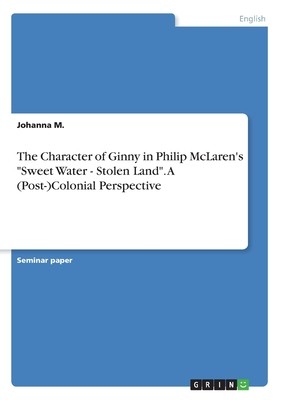
- We will send in 10–14 business days.
- Author: Johanna M
- Publisher: GRIN Verlag
- Year: 2020
- Pages: 28
- ISBN-10: 3346176533
- ISBN-13: 9783346176530
- Format: 14.8 x 21 x 0.2 cm, softcover
- Language: English
- SAVE -10% with code: EXTRA
The Character of Ginny in Philip McLaren's Sweet Water - Stolen Land. A (Post-)Colonial Perspective (e-book) (used book) | bookbook.eu
Reviews
Description
Seminar paper from the year 2018 in the subject English Language and Literature Studies - Literature, grade: 1,0, University of Duisburg-Essen (Department of Anglophone Studies, British and Postcolonial Studies), course: Indigenous Australian Literature and Culture, language: English, abstract: Philip McLaren is a descendant of the Kamilaroi people from the Warrumbungle Mountains in New South Wales, Australia. This is the region where his first novel 'Sweet Water - Stolen Land', a confronting tale about the first encounter of indigenous Australian people with white settlers and colonial invaders, published in 1993, is set. The focus of this term paper lies on the character of Ginny of the Kamilaroi people. Her character actually is semi-historical. The whole novel itself is indeed fictional in most parts but includes historical events that are incorporated into the fictional plot. Ginny Griffin did actually exist, she was McLaren's great-great-grandmother and became leader and spokesperson for the Aboriginal people of Coonabarabran. The depiction of her character in the novel is both striking and interesting to analyse as it on the one hand gives a representative presentation of (female) indigenous Australian experiences under the burden of colonization because of the biographical background it is created on. On the other hand, Ginny's character illustrates the processes and consequences of colonial and imperial rules imposed on indigenous people(s) (of the Australian continent) from the very beginning of the acquisition of the English language, as it is discussed in chapter 1, over the colonial domination and torture that in Ginny's case is even a doubled form of colonization, which will be examined in chapter 2, to the forming of a new transitional form of culture and way of living and the reversal of colonial constraints when Ginny starts to use the colonial system's own means against the oppressors of her people, which will be investigated in chapter 3. The go
EXTRA 10 % discount with code: EXTRA
The promotion ends in 15d.18:16:21
The discount code is valid when purchasing from 10 €. Discounts do not stack.
- Author: Johanna M
- Publisher: GRIN Verlag
- Year: 2020
- Pages: 28
- ISBN-10: 3346176533
- ISBN-13: 9783346176530
- Format: 14.8 x 21 x 0.2 cm, softcover
- Language: English English
Seminar paper from the year 2018 in the subject English Language and Literature Studies - Literature, grade: 1,0, University of Duisburg-Essen (Department of Anglophone Studies, British and Postcolonial Studies), course: Indigenous Australian Literature and Culture, language: English, abstract: Philip McLaren is a descendant of the Kamilaroi people from the Warrumbungle Mountains in New South Wales, Australia. This is the region where his first novel 'Sweet Water - Stolen Land', a confronting tale about the first encounter of indigenous Australian people with white settlers and colonial invaders, published in 1993, is set. The focus of this term paper lies on the character of Ginny of the Kamilaroi people. Her character actually is semi-historical. The whole novel itself is indeed fictional in most parts but includes historical events that are incorporated into the fictional plot. Ginny Griffin did actually exist, she was McLaren's great-great-grandmother and became leader and spokesperson for the Aboriginal people of Coonabarabran. The depiction of her character in the novel is both striking and interesting to analyse as it on the one hand gives a representative presentation of (female) indigenous Australian experiences under the burden of colonization because of the biographical background it is created on. On the other hand, Ginny's character illustrates the processes and consequences of colonial and imperial rules imposed on indigenous people(s) (of the Australian continent) from the very beginning of the acquisition of the English language, as it is discussed in chapter 1, over the colonial domination and torture that in Ginny's case is even a doubled form of colonization, which will be examined in chapter 2, to the forming of a new transitional form of culture and way of living and the reversal of colonial constraints when Ginny starts to use the colonial system's own means against the oppressors of her people, which will be investigated in chapter 3. The go


Reviews